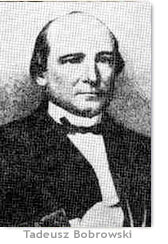 |
By J. H. Stape, Research Fellow in St
Mary's University College, Twickenham
Tadeusz Bobrowski, A
Memoir of My Life, translated and introduced by Addison
Bross. Eastern European Monographs. New York: (Columbia University
Press, 2008. 469 pp. £34.50/ $50.00
This generous selection – approximately
a third of the whole – from Tadeusz Bobrowski memoirs, posthumously
published in 1900 and republished in Polish in 1979, makes available
to the non-Polish reader materials essential for understanding the
ideological, cultural, and political contexts that informed Conrad’s
life and values and offers insight into the “cultural space”
in which he, his immediate family, and compatriots were nurtured.
Najder’s extracts in Conrad Under Familial Eyes (1983)
whetted the appetite for more, and Bross’s long-awaited work
now makes this available.
Bross offers a signally lucid and useful account
in his hundred-page “Introductory Essay” to the background
of this work, a Slavic world as remote from the Western sensibility
as it is in time now. The nature of the gentry class, the szlachta,
to which Bobrowski and his brother-in-law, Apollo Korzeniowski,
Conrad’s father, belonged comes under scrutiny and is well
described here. Bross is alert to the internal tensions, insularity,
and self-preoccupations of this group, the self-proclaimed bulwark
of the nation, whose members shared ideals but were no monolithic
grouping, differing widely in economic status.
No less well described are the remarkably
tangled politics and ethnic composition of the Ukraine (then Ruthenia)
where Conrad was born. Bross is most helpful on the inter-layered
realities of the time and place: distant from the Polish heartland,
once legally Polish but at the time of Conrad’s birth under
Russian control for some two generations, the area was, in essence,
an agricultural backwater where the Polish gentry held the Ukrainian
majority as serfs.
Bross also offers an account of the publication
history of Bobrowski's memoir, a discussion of the principles of
selection used in his translation – lengthy sections representative
of the work rather than thematically grouped snippets have been
preferred – and a concise and useful "Chronology"
(to Bobrowski's life). As to the translation itself , one would
wish that the editor/translator had exercised a freer hand at points,
making paragraph-breaks that would allow the reader a brief rest
among the plethora of details, names, and facts.
As to these, Bobrowski’s own footnotes
have mainly been cut, as have the appendices to his original. Bross’s
footnotes , oddly produced within square brackets, appear at the
end of each selection. They illuminate facts and also occasionally
offer commentary or supplementary matter. Disconcertingly, Bobrowski’s
notes and Bross’s are not distinguished, although the reader
can generally sort out ownership fairly rapidly.
Bobrowski, who insisted upon a gradualist
and non-violent approach to the end of Russian domination, in contrast
to his fiery brother-in-law, comes across as balanced and even-handed.
The memoir is shot through with deep conviction, and the anecdotes,
family memories, and reflections allow glimpses of a complex personality,
one sometimes markedly at odds with other modes of being in its
time and place.
The highly detailed history of the Bobrowski
family will not raise the pulse of most readers, but after this
obligatory section, the pace of these selections picks up, and the
patient reader is rewarded with a portrait of a strange world where
ethnic passions, family loyalties, and strongly held beliefs collide.
Particularly interesting are Bobrowski’s memories of his years
as a law student at St Petersburg University, whereby it becomes
clear that he (and others like him) provided elements for Razumov
in Under Western Eyes.
Nor does this section lack an antagonist resembling
Haldin: Bobrowski enjoyed an uneasy friendship with Zygmunt Sierakowski
(1826–63), whom he had known in the Ukraine and who was a
close friend of his brother Stefan. Involved in liberal and patriotic
causes and a leader in political discussion groups whilst at St
Petersburg University – which Bobrowski pointedly avoided
– Sierakowski afterwards made a career in the Russian army.
A participant in the 1863 Insurrection, he was hanged even though
dying from wounds sustained in action.
A controversial figure in Conrad studies, Bobrowski,
Conrad’s maternal uncle and guardian, has had both his ardent
champions and detractors, and the debate over his influence over
his ward has at times been vivid. From these pages, he emerges as
a man completely of his time, issue of a conservative and nostalgic
tradition, but, in his case, pragmatism and a stern sense of realism
offered a counterbalance to patriotic ideals.
The volume provides an index to Bross’s
prefatory essay, but none to the work itself, making searching out
references and connections difficult. Missing, too, is a map of
the mid-nineteenth-century Ukraine and family trees, both of which
would have proved most helpful to the non-specialist. Canny editorial
advice on these matters would obviously have been welcome and made
the volume more user friendly.
That said, this is a major contribution to
the documents about Conrad’s early life, and along with the
“Bobrowski Memoir” and the varied pieces in Conrad
Under Familial Eyes will allow Conrad scholars and enthusiasts
alike to discover or explore this territory anew.
©
2011 J H Stape
|

